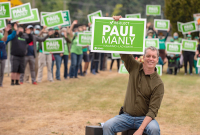Support strong Canadian climate journalism for 2025
In the past two federal elections, Vancouver Island has been a stronghold for the NDP, and one campaign observer predicts it will largely stay that way after Sept. 20.
But there are some chinks in the orange armour on the island given the strength of voter concern about the climate crisis and Erin O’Toole bumping up the popularity of the Conservatives, the NDP’s historical nemesis in the region.
There’s no doubt the recent Green Party infighting offers the NDP some advantage this election with climate-concerned voters, said Mark Williams, chair of political studies at Vancouver Island University.
But the edge the NDP might enjoy could be undercut by the anger environmentally conscious voters feel for the B.C. NDP government around the protection of old-growth forests and the contentious Fairy Creek blockades, he said.
Regardless, the NDP shouldn’t underestimate the Green vote, which has been on the rise in southern Vancouver Island ridings over the last couple of elections, Williams said.
“In the south, I think that there's a large contingent of people (who) are really kind of viewing everything through the climate crisis,” he said.
This strength of environmental concerns has created a number of four-way races in the region, particularly in Victoria and the riding of Esquimalt-Saanich-Sooke.
But if there is any potential for an NDP upset, it would be in Victoria where the race is particularly tight, Williams said.
“It is very possible, although I don’t think it’s going to happen,” he said
“But it probably would have if the Green Party leadership was in better shape.”
However, many pundits predict the NDP will actually increase its hold on the island by retaking the Nanaimo-Ladysmith riding won by the Greens in 2019.
NDP Leader Jagmeet Singh is certainly hoping so. He has visited the riding twice in the past couple of months in a bid to unseat incumbent Paul Manly, who won the last election by a comfortable margin over his nearest Conservative competitor while the NDP came third. But Williams disagrees, citing the deep roots and individual support Manly enjoys in the riding.
“I imagine Paul Manly will win in Nanaimo-Ladysmith,” he said, noting the incumbent enjoyed a 10 per cent lead over the second-place candidate.
“I don't really see either the Conservatives or the NDP really having the forces in play that will allow them to unseat him.
“The Green Party leadership is in disarray, but I think that Manly's support is still quite strong.”
While the NDP needs to be wary of the Greens in the heavily populated south — where voters are no longer as committed to the resource economy — the Tories are the main competition in the central and northern regions of the island, Williams said.
“Especially in the (north) there is that sense that we need to support extractive industry,” he said.
“So, that's where Conservatives are fairly strong and a serious challenge to the NDP.”
But Conservative support in individual ridings depends heavily on the personality and profile of the candidates, he said.
The rise of the NDP at the expense of the Tories — which used to sweep Vancouver Island — is likely due to an increasing sense of inequality and the party’s commitment to socially progressive ideals that benefit workers, Williams said.
“There is this growing disillusionment with approaches that seem too laissez-faire, or too free market, and there’s a sense that economic activity really needs to benefit society more broadly,” he said.
“This pushback against the Conservative party is (voters) aren’t entirely convinced their policies are going to really deliver on jobs and improvements in quality of life.
“Where it seems the NDP and their focus on workers’ rights seems to connect with a lot of people on Vancouver Island.”
While each riding has specific issues of importance this election, many of the key concerns across Vancouver Island reflect those on the national stage, Williams said. Health care, housing, affordability, climate change, and Indigenous issues are top of mind on the island, he said.
The lack of family doctors or access to medical care, housing prices coupled with a rental crisis, and the rising costs of living are issues across the island — in urban and rural communities, he added.
“Affordability is one of those things that just seems to be resonating throughout the country,” he said.
“Even a relatively small city like Nanaimo has seen real estate prices increase by $300,000 for homes within the last ... six years.”
And with a large number of First Nations communities on the island, people have a heightened awareness around the importance of Indigenous rights and reconciliation, he added.
In the end, it’s probably the breadth of the issues of concern in the election that gives the NDP an advantage over the Greens on Vancouver Island, Williams said.
“The NDP is dedicated to environmental policy, but it's done so ... within this context of economic security, which I think still resonates with a lot of voters on the island.”
Rochelle Baker / Local Journalism Initiative / Canada’s National Observer







Comments